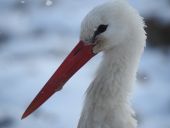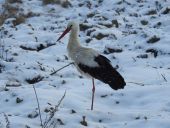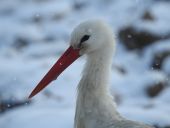Winter is coming. More and more people who are sensitive to the fate of animals are worried about the situation of storks which have not flown to wintering grounds in Africa. That's why we decided to prepare information on this subject in order to clarify a few issues related to this topic and to debunk some myths. Is there really anything to worry about? We encourage you to read the text below.
Based on observations made in recent years, it seems that recently the phenomenon of storks staying in our country has started to intensify. Is it really so? It is not known, because it can simply be an effect of faster and further spreading of information on this topic (e.g. through social media). This phenomenon has indeed occurred in Portugal and Spain, where some birds no longer migrate at all.
A recent study carried out in Germany using GPS-GSM transmitters, which were fixed to young birds, showed that all the individuals which tried to winter in Europe survived. Almost 40% of the storks who flew to wintering grounds in Africa for the winter died. This is also confirmed by the studies of PTOP (Polish Bird Protection Society) and many other scientists from Poland, who follow the migration using GPS-GSM transmitters. The majority of the birds do not reach the wintering grounds and die along the way on power lines. This is how almost all of our storks, healed in rehabilitation centers, fitted with transmitters in the years 2017-2018, ended their lives.
Food is scarce during winter. However, the last winters, during which the snow cover only lingers for 1-4 weeks, make it easier to find something to eat. There is not much of it, sometimes a vole or a carrion, leftovers from a landfill site, but with economical use of energy (little movement, a lot of rest), it is often enough. That is why many birds, not only storks, are "dulled" on frosty days. It is not, however, a sign of their weakness or illness, but a way to survive the winter. Attempts to catch storks during this period may harm them rather than help them. The loss of energy while escaping from the "rescuers" can lead to death during a freezing night.
Another frequently discussed aspect is the cold and the likelihood of a stork’s freezing. The feathers, or actually the air stored between them, is the best thermal insulator in the world. Let's not forget which jackets are the warmest during cold winters. Of course, down jackets! But there are also legs that are usually not feathered. Birds have a different cardiovascular system than humans. The special arrangement of blood vessels in the leg causes the hot arterial blood to be cooled by the venous one, and the other way round - the venous blood is heated by the arterial one. As a result, the returning blood does not cool the organism, and the temperature difference between the blood reaching the legs and the environment is small, which reduces the loss of heat, and a smaller temperature amplitude mitigates the feeling of cold. An additional solution for coping with the cold is to reduce blood flow by shrinking blood vessels. There is still a beak left.
This organ is not supplied with blood as it is made of corneous tissue, therefore its freezing is not possible. The truth is that if it were not for the lack of food in winter, many storks would not go to the so-called warm countries, where they fly not for the purpose of warming up, but to have something to eat.
So when should we intervene and try to help a wintering stork? First of all, we should observe such an individual. If it flies and moves easily, there is no need to intervene. We also should not feed such birds, because they get used to the feed and will not try to migrate to other warmer regions when the cold comes and the snow falls. In addition, feeding proper food is very expensive for the person who decides to do so. Only storks showing clear signs of weakness or injury should be caught and transferred to rehabilitation centers, and this decision should be made after careful prior observation of the wintering stork.




